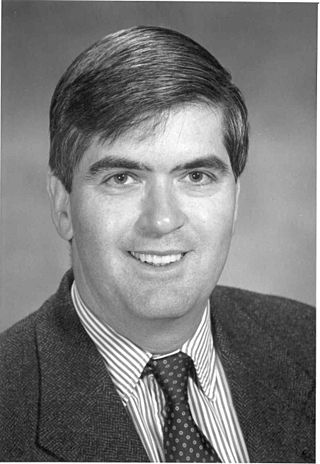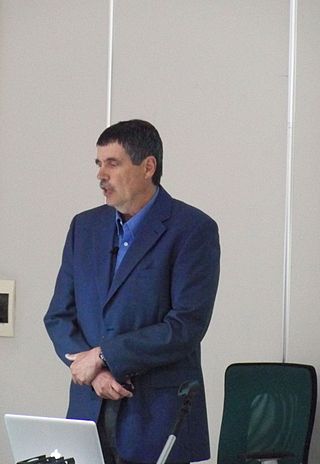External links
| International | |
|---|---|
| National | |
| Academics | |
| Other | |
David Epel is a researcher at Hopkins Marine Station in Pacific Grove, California, and a Professor (Emeritus) in the Department of Biology at Stanford University.
Epel earned his Ph.D. at University of California Berkeley under Daniel Mazia. He arrived at Hopkins Marine Station in 1965. Subsequently, Professor Epel spent seven years at University of California San Diego's Scripps Institution of Oceanography. He completed a postdoc with Britton Chance at the University of Pennsylvania. Professor Epel has been a Guggenheim Fellow, and is a Fellow of the American Association for the Advancement of Science.
His work focuses on egg activation during fertilization, as well as stress on embryonic development.
| Scientific Lineage | |||
Ph.D. Daniel Mazia University of California Berkeley | David Epel | Students mentored George Perry Rebecca Vega Thurber | |
| Postdoctoral Fellow Britton Chance University of Pennsylvania | |||

Clare Hall is a constituent college of the University of Cambridge. Founded in 1966 by Clare College, Clare Hall is a college for advanced study, admitting only postgraduate students alongside postdoctoral researchers and fellows. It was established to serve as an Institute of Advanced Studies and has slowly grown and developed into a full constituent college. It is a registered charity.

Elizabeth Helen Blackburn is an Australian-American Nobel laureate who is the former president of the Salk Institute for Biological Studies. In 1984, Blackburn co-discovered telomerase, the enzyme that replenishes the telomere, with Carol W. Greider. For this work, she was awarded the 2009 Nobel Prize in Physiology or Medicine, sharing it with Carol W. Greider and Jack W. Szostak, becoming the first Australian woman Nobel laureate.
Hopkins Marine Station is the marine laboratory of Stanford University. It is located 90 miles (145 km) south of the university's main campus, in Pacific Grove, California on the Monterey Peninsula, adjacent to the Monterey Bay Aquarium. It is home to ten research laboratories and a fluctuating population of graduate and undergraduate students. It has also been used for archaeological exploration, including of the Chinese-American fishing village that existed on the site before burning down in 1906.
Daniel Mazia was an American cell biologist, best known for his research that isolated the cell structures responsible for mitosis. His research was the gateway for many later discoveries about the cell cycle, cell division, and many other areas in cell biology.

George Perry is a professor of biology and chemistry at the University of Texas at San Antonio and the former dean of the College of Sciences. Perry is recognized in the field of Alzheimer's disease research, particularly for his work on oxidative stress.

Isabella Aiona Abbott was an educator, phycologist, and ethnobotanist from Hawaii. The first native Hawaiian woman to receive a PhD in science, she became a leading expert on Pacific marine algae.
Horace Albert "Nook" Barker (November 29, 1907 – December 24, 2000) was an American biochemist and microbiologist who studied the operation of biological and chemical processes in plants, humans and other animals, including using radioactive tracers to determine the role enzymes play in synthesizing sucrose. He was recognized with the National Medal of Science for his role in identifying an active form of Vitamin B12.

John Charles Avise is an American evolutionary geneticist, conservationist, natural historian, and prolific science author. He is an Emeritus Distinguished Professor of Ecology & Evolution, University of California, Irvine, and was previously a Distinguished Professor of Genetics at the University of Georgia.
Michael T. Goodrich is a mathematician and computer scientist. He is a distinguished professor of computer science and the former chair of the department of computer science in the Donald Bren School of Information and Computer Sciences at the University of California, Irvine.
Les Kaufman is an evolutionary ecologist specializing in the biology and conservation of aquatic ecosystems. He has special expertise in coral reef biology, the evolution and ecology of tropical great lakes fishes, and ecosystem-based management of marine resources.
Rolf Ling Bolin was an American academic ichthyologist. A genus of lanternfish, Bolinichthys, is named for him.
Marc Kamionkowski is an American theoretical physicist and currently the William R. Kenan, Jr. Professor of Physics and Astronomy at Johns Hopkins University. His research interests include particle physics, dark matter, inflation, the cosmic microwave background and gravitational waves.
Anne Catherine Hof Blinks (1903–1995) was an American botanist and textiles scholar.
Scott Frederick Gilbert is an American evolutionary developmental biologist and historian of biology.
Donald Putnam Abbott was an invertebrate zoologist and professor of biology at the Hopkins Marine Station of Stanford University from 1950 through 1982. He earned his Ph.D. under S. F. Light and Ralph Smith at the University of California, Berkeley. Abbott was an expert on ascidian tunicates and an authority on all forms of invertebrate animals. He was an influential teacher, researcher, author, and student mentor. His wife, Isabella Abbott, was a world authority on marine algae of the Pacific.

Timothy Hopkins was the adopted son of Central Pacific Railroad co-owner Mark Hopkins' widow, Mary Hopkins, and friend of another co-owner Leland Stanford and his wife, Jane. He was one of the founders of Palo Alto and a trustee of Stanford University for over 50 years. His estate is now the site of the Menlo Park Civic Center and of SRI International.

Stephen R. Palumbi is the Jane and Marshall Steel Jr. Professor in Marine Sciences at Stanford University at Hopkins Marine Station. He also holds a Senior Fellowship at the Stanford Woods Institute for the Environment.
Walter Kenrick Fisher was an American zoologist, evolutionary biologist, illustrator, and painter. He taught in Stanford University before eventually becoming Emeritus Professor in Zoology until his retirement in 1943. Fisher was the son of ornithologist Albert Kenrick Fisher.
James Standish Clegg is a Professor Emeritus of Biochemistry at University of California, Davis, based at the Coastal and Marine Sciences Institute (CMSI) in Bodega Bay, California. He served as director of the Bodega Marine Laboratory (BML) from 1986 to 1999 and as president of the National Association Marine Laboratories (NAML) from 1991 to 1993.
Elissa Sarah Epel is an American health psychologist. She is a professor in the Department of Psychiatry at the University of California, San Francisco (UCSF), director of UCSF’s Aging, Metabolism, and Emotion Center, and associate director of the Center for Health and Community.